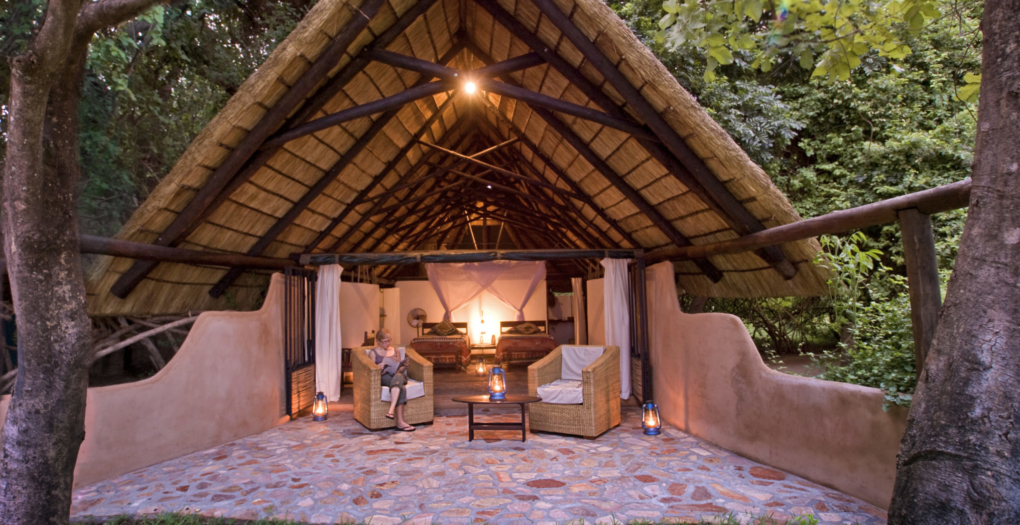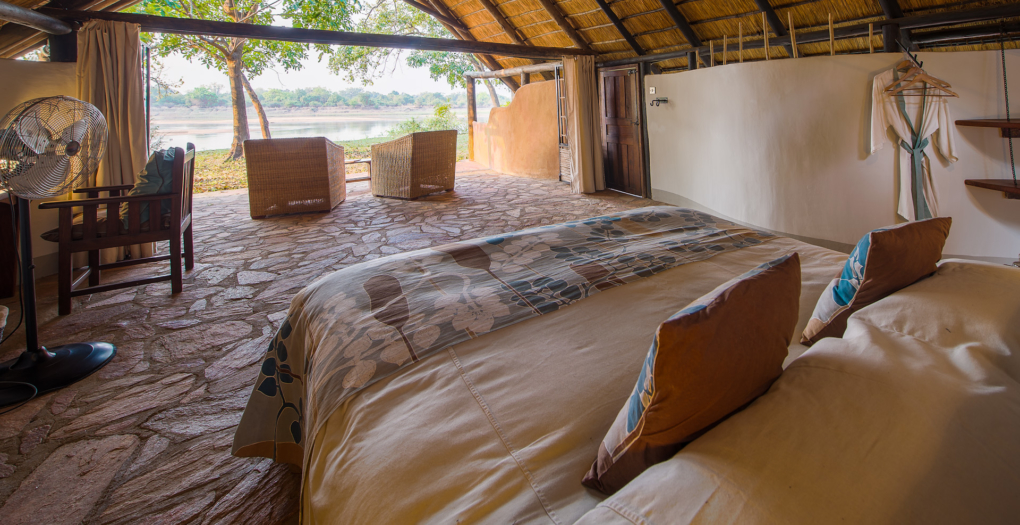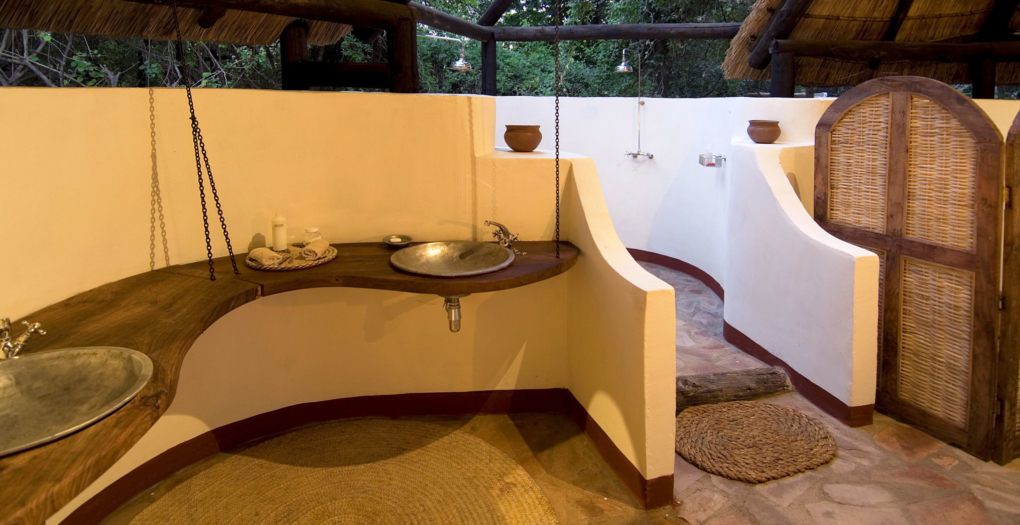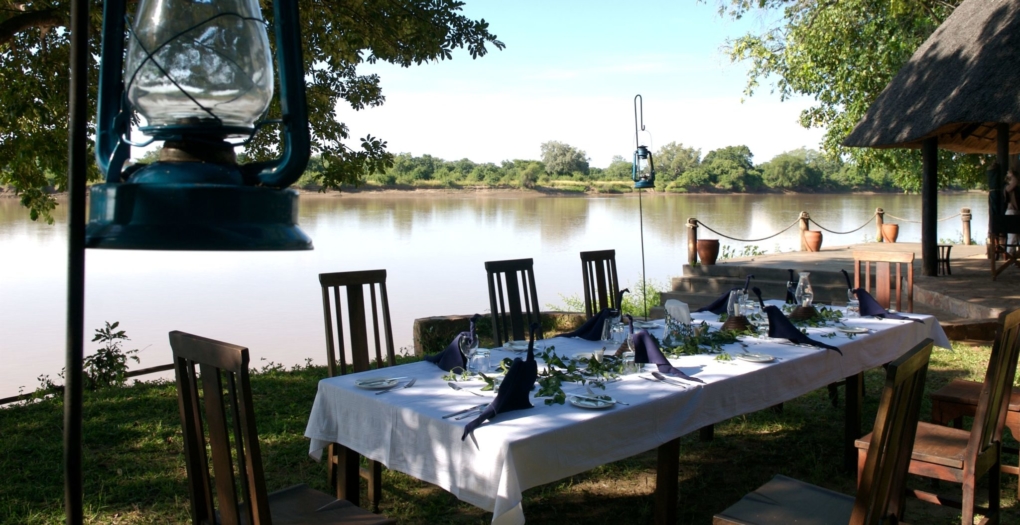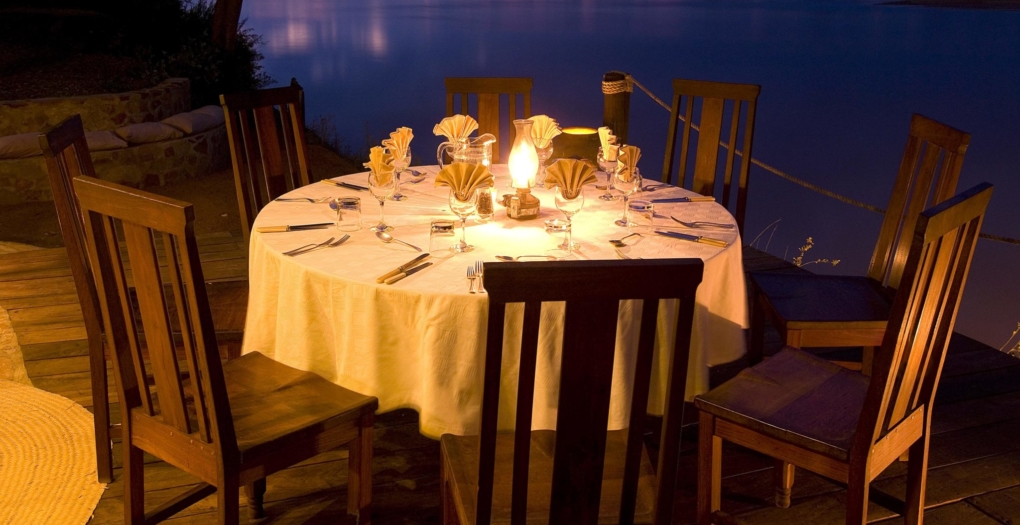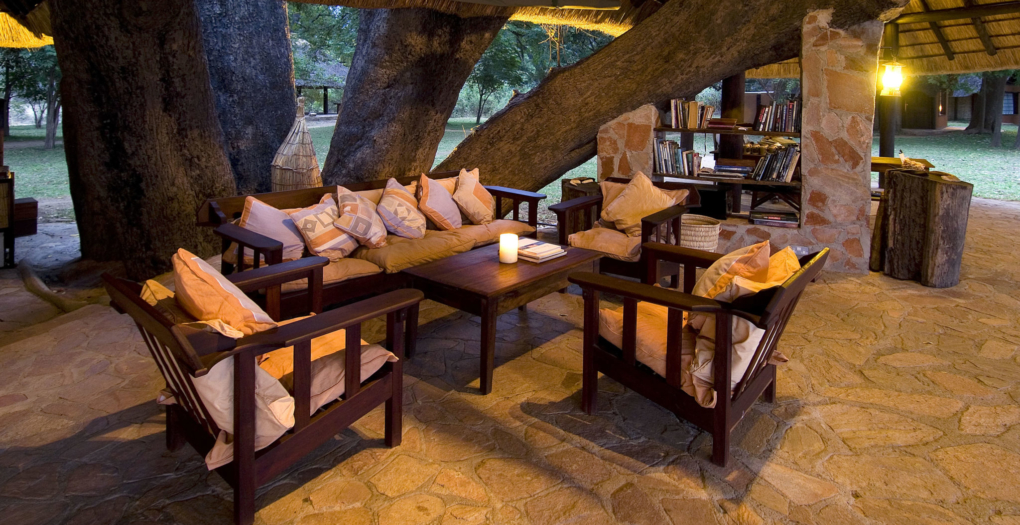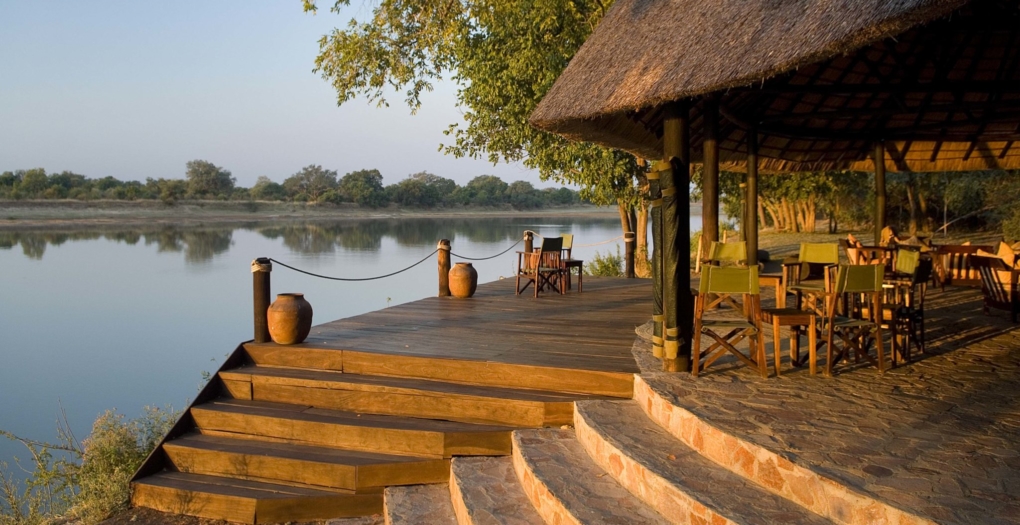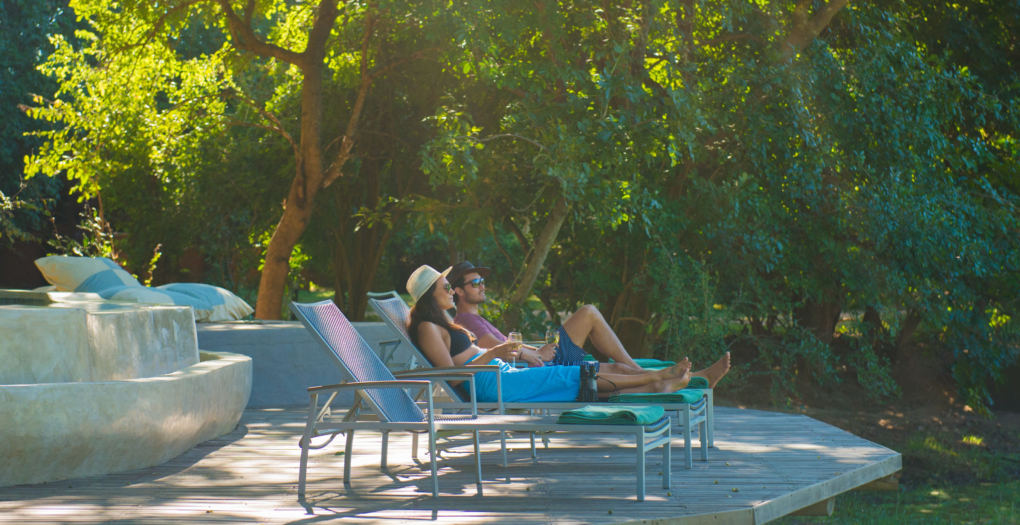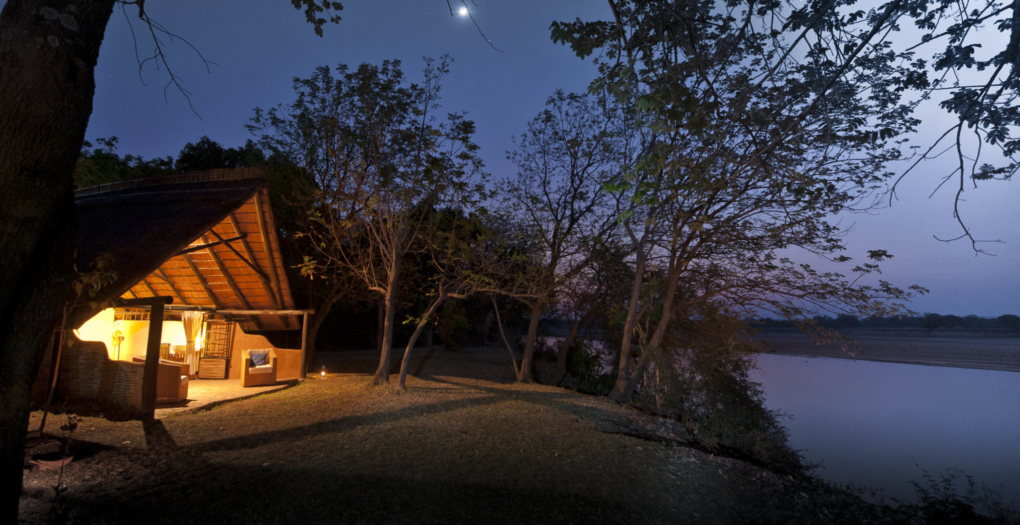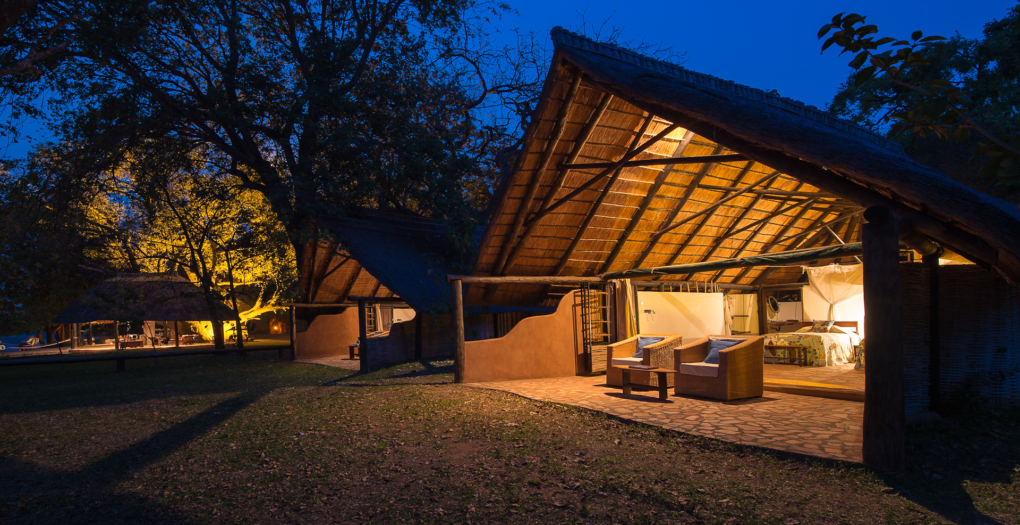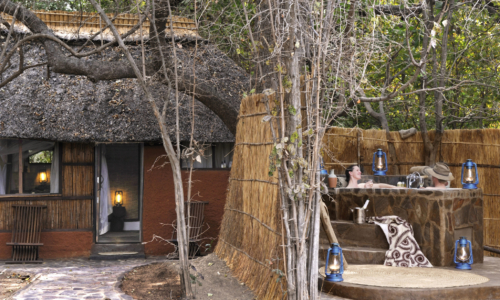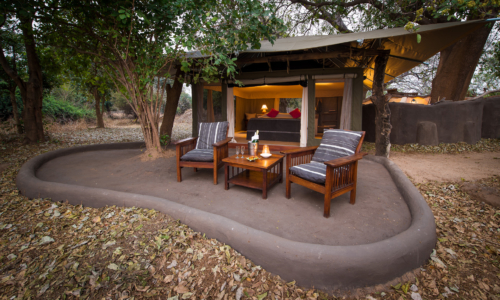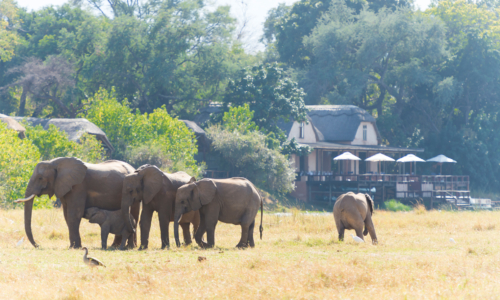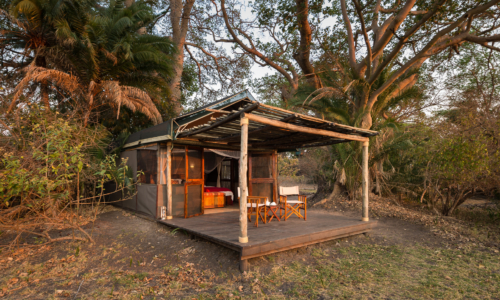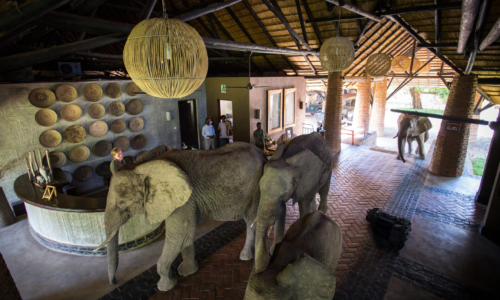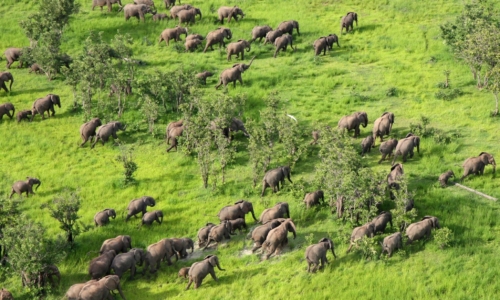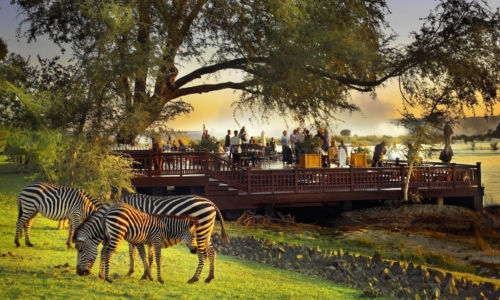Accommodations at the camp consist of six charming chalets. Each chalet is made with woven bamboo walls and thatched roofs that blend harmoniously into the natural environment. There is one double room, four twins, and a honeymoon suite/family suite to choose from which can house up to a maximum of fourteen guests. Each chalet is furnished with an open, spacious bedroom and sitting area with views of the river and an alfresco en suite bathroom with a double vanity and a shower. At night, the Constantia grill doors are pulled together for added privacy.
The camp is located on the banks of the Luangwa River on Robin Pope Safaris’ private land outside South Luangwa National Park, a world-famous wildlife haven. The 5,623-square mile park enjoys a dense animal population including impalas, pukus, waterbucks, giraffes, and buffaloes grazing on the plains. A high number of leopards stalk the dense woodlands, while herds of elephant wade through the marshes and hippos play in the Luangwa River. The Muchinga Escarpment forms the park’s western and northwestern boundaries, sloping steeply down to the river from the west side. The river valley, continued to the west by the Lunsemfwa River valley, forms a natural barrier, and to this day there are no man-made roads spanning the valley.
There are both day and night game drives available in comfortable Toyota Landcruisers and conducted by an expert guide. Walking safaris study the park in greater detail and observe the smaller animals with the aid of a guide and an armed National Park Ranger. Bird watchers can enjoy spotting some of the 400 recorded bird species in the region. From the end of December to April, seasonal boat trips explore the rain-filled lagoons. For those seeking more local culture, there is a unforgettable tour of Kawaza Village. The Wildlife Education Center is a great place to visit, especially for children who can learn how the local kids are taught about wildlife and conservation.
At the center of camp lives an enormous ebony tree, the camp’s bar is molded around the trunk utilizing its natural shade as well as being the main focal point of the site. A raised deck provides excellent views of the river and invites guests to relax with a refreshing drink and soak in the sunsets. Both the dining room and swimming pool are set back from the river on a lagoon where elephants are frequent visitors.

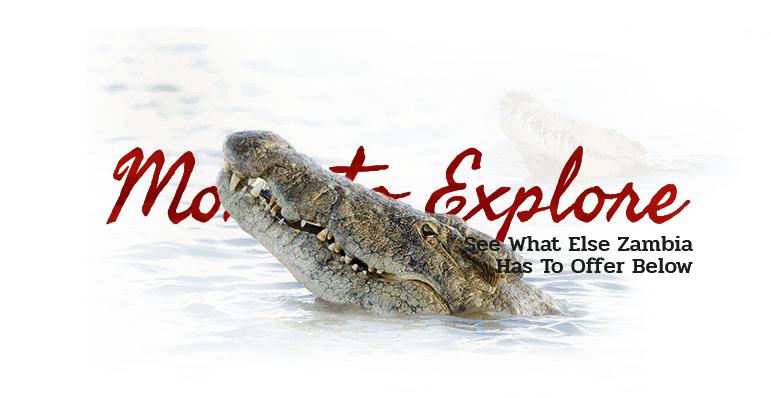
- Baines’ River Camp
- Bilimungwe Bushcamp
- Busanga Bush Camp
- Chamilandu Bushcamp
- Chiawa Camp
- Chindeni Bushcamp
- Chinzombo
- Chongwe Camp
- Kaingo Camp
- Kakuli Camp
- Kapamba Bushcamp
- King Lewanika
- KuKaya
- Kuyenda Bushcamp
- Lion Camp
- Lolebezi Safari Lodge
- Luangwa River Camp
- Luwi Camp
- Mchenja Camp
- Mfuwe Lodge
- Mwamba Camp
- Nkwali
- Nsefu Camp
- Nsolo Camp
- Old Mondoro
- Potato Bush Camp
- Puku Ridge Camp
- Royal Zambezi Lodge
- Sausage Tree Camp
- Shumba Camp
- Sindabezi Island
- Sungani Lodge
- Sussi & Chuma
- Tena Tena Lodge
- The River Club
- Thorntree River Lodge
- Tintswalo at Siankaba
- Toka Leya Camp
- Tongabezi
- Zungulila Bushcamp
Coming soon!
- Baines’ River Camp
- Bilimungwe Bushcamp
- Busanga Bush Camp
- Chamilandu Bushcamp
- Chiawa Camp
- Chindeni Bushcamp
- Chinzombo
- Chongwe Camp
- Kaingo Camp
- Kakuli Camp
- Kapamba Bushcamp
- King Lewanika
- KuKaya
- Kuyenda Bushcamp
- Lion Camp
- Lolebezi Safari Lodge
- Luangwa River Camp
- Luwi Camp
- Mchenja Camp
- Mfuwe Lodge
- Mwamba Camp
- Nkwali
- Nsefu Camp
- Nsolo Camp
- Old Mondoro
- Potato Bush Camp
- Puku Ridge Camp
- Royal Zambezi Lodge
- Sausage Tree Camp
- Shumba Camp
- Sindabezi Island
- Sungani Lodge
- Sussi & Chuma
- Tena Tena Lodge
- The River Club
- Thorntree River Lodge
- Tintswalo at Siankaba
- Toka Leya Camp
- Tongabezi
- Zungulila Bushcamp
Coming soon!

Accommodations at the camp consist of six charming chalets. Each chalet is made with woven bamboo walls and thatched roofs that blend harmoniously into the natural environment. There is one double room, four twins, and a honeymoon suite/family suite to choose from which can house up to a maximum of fourteen guests. Each chalet is furnished with an open, spacious bedroom and sitting area with views of the river and an alfresco en suite bathroom with a double vanity and a shower. At night, the Constantia grill doors are pulled together for added privacy.
The camp is located on the banks of the Luangwa River on Robin Pope Safaris’ private land outside South Luangwa National Park, a world-famous wildlife haven. The 5,623-square mile park enjoys a dense animal population including impalas, pukus, waterbucks, giraffes, and buffaloes grazing on the plains. A high number of leopards stalk the dense woodlands, while herds of elephant wade through the marshes and hippos play in the Luangwa River. The Muchinga Escarpment forms the park’s western and northwestern boundaries, sloping steeply down to the river from the west side. The river valley, continued to the west by the Lunsemfwa River valley, forms a natural barrier, and to this day there are no man-made roads spanning the valley.
There are both day and night game drives available in comfortable Toyota Landcruisers and conducted by an expert guide. Walking safaris study the park in greater detail and observe the smaller animals with the aid of a guide and an armed National Park Ranger. Bird watchers can enjoy spotting some of the 400 recorded bird species in the region. From the end of December to April, seasonal boat trips explore the rain-filled lagoons. For those seeking more local culture, there is a unforgettable tour of Kawaza Village. The Wildlife Education Center is a great place to visit, especially for children who can learn how the local kids are taught about wildlife and conservation.
At the center of camp lives an enormous ebony tree, the camp’s bar is molded around the trunk utilizing its natural shade as well as being the main focal point of the site. A raised deck provides excellent views of the river and invites guests to relax with a refreshing drink and soak in the sunsets. Both the dining room and swimming pool are set back from the river on a lagoon where elephants are frequent visitors.

- Baines’ River Camp
- Bilimungwe Bushcamp
- Busanga Bush Camp
- Chamilandu Bushcamp
- Chiawa Camp
- Chindeni Bushcamp
- Chinzombo
- Chongwe Camp
- Kaingo Camp
- Kakuli Camp
- Kapamba Bushcamp
- King Lewanika
- KuKaya
- Kuyenda Bushcamp
- Lion Camp
- Lolebezi Safari Lodge
- Luangwa River Camp
- Luwi Camp
- Mchenja Camp
- Mfuwe Lodge
- Mwamba Camp
- Nkwali
- Nsefu Camp
- Nsolo Camp
- Old Mondoro
- Potato Bush Camp
- Puku Ridge Camp
- Royal Zambezi Lodge
- Sausage Tree Camp
- Shumba Camp
- Sindabezi Island
- Sungani Lodge
- Sussi & Chuma
- Tena Tena Lodge
- The River Club
- Thorntree River Lodge
- Tintswalo at Siankaba
- Toka Leya Camp
- Tongabezi
- Zungulila Bushcamp
Coming soon!
- Baines’ River Camp
- Bilimungwe Bushcamp
- Busanga Bush Camp
- Chamilandu Bushcamp
- Chiawa Camp
- Chindeni Bushcamp
- Chinzombo
- Chongwe Camp
- Kaingo Camp
- Kakuli Camp
- Kapamba Bushcamp
- King Lewanika
- KuKaya
- Kuyenda Bushcamp
- Lion Camp
- Lolebezi Safari Lodge
- Luangwa River Camp
- Luwi Camp
- Mchenja Camp
- Mfuwe Lodge
- Mwamba Camp
- Nkwali
- Nsefu Camp
- Nsolo Camp
- Old Mondoro
- Potato Bush Camp
- Puku Ridge Camp
- Royal Zambezi Lodge
- Sausage Tree Camp
- Shumba Camp
- Sindabezi Island
- Sungani Lodge
- Sussi & Chuma
- Tena Tena Lodge
- The River Club
- Thorntree River Lodge
- Tintswalo at Siankaba
- Toka Leya Camp
- Tongabezi
- Zungulila Bushcamp
Coming soon!







